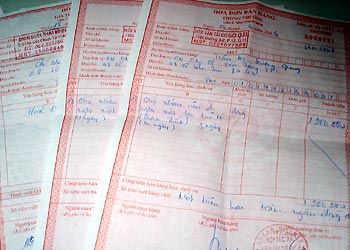What is a Red Invoice?
Invoice is a document issued by the seller, recording sales and service supply information as prescribed by law. In transactions of purchasing goods and services, the most commonly mentioned type of invoice is the "red invoice."
Red Invoice is another term for a value-added tax invoice. Before the regulation on businesses using self-printed invoices, most businesses used value-added tax invoices to give to buyers. Particularly, the second copy of the value-added tax invoice, which is given to customers, is red in color. Based on this color characteristic, the value-added tax invoice is commonly referred to as the red invoice.
The red invoice is the basis for the state to calculate value-added tax. This type of invoice is directly imposed on consumers. When there is a red invoice, it means that consumers must pay a tax amount to the state, collected through the seller.

The issuance of red invoices, in particular, and invoices in general must comply with several legal provisions. Acts of violation regarding invoices can be subject to administrative penalties as stipulated in Circular 10/2014/TT-BTC and Decree 49/2016/ND-CP.
Circular 10/2014/TT-BTC stipulates administrative penalty measures for invoice violations, including:
- Warning fines applied to invoice violations that do not cause serious consequences and have mitigating circumstances.- Monetary fines, with a maximum penalty of up to 50 million VND for organizations committing invoice violations.
The application of monetary fines for invoice violations is based on the aggravating or mitigating circumstances of the act to determine the corresponding penalty.
Besides the aforementioned penalties, some invoice violations may be subject to additional penalties and measures to remedy the consequences.
In cases where invoice violations lead to incorrect tax declarations resulting in a lower amount of payable tax or an increased amount of deductible or refundable tax, or lead to tax evasion and fraud, these violations will be penalized in accordance with the guidelines in Circular 10 and administrative penalties for tax violations as stipulated.
- Number of deputy directors of departments in Vietnam in accordance with Decree 45/2025/ND-CP
- Cases ineligible for pardon in Vietnam in 2025
- Decree 50/2025 amending Decree 151/2017 on the management of public assets in Vietnam
- Circular 07/2025 amending Circular 02/2022 on the Law on Environmental Protection in Vietnam
- Adjustment to the organizational structure of the Ministry of Health of Vietnam: Certain agencies are no longer listed in the organizational structure
- Vietnam aims to welcome 22-23 million international tourists in Vietnam in 2025
-

- Notable new policies of Vietnam effective as of ...
- 16:26, 11/04/2025
-
.Medium.png)
- Notable documents of Vietnam in the previous week ...
- 16:21, 11/04/2025
-
.Medium.png)
- Notable documents of Vietnam in the previous week ...
- 16:11, 02/04/2025
-
.Medium.png)
- Notable new policies of Vietnam to be effective ...
- 16:04, 02/04/2025
-
.Medium.png)
- Notable new policies of Vietnam effective from ...
- 14:51, 21/03/2025
 Article table of contents
Article table of contents
